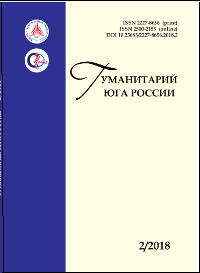Развитие методологии исследований новой социальной реальности: практики социальной эксклюзии
Для цитирования
Родионова В. И., Швачкина Л. А. Развитие методологии исследований новой социальной реальности: практики социальной эксклюзии // Гуманитарий Юга России. 2018. Том 7. № 2. С. 100-108. DOI: https://doi.org/10.23683/2227-8656.2018.2.8
Аннотация
В статье производится анализ методологии исследования новой социальной реальности, социальной эксклюзии в российском обществе в современной социологической мысли. Авторы статьи обосновывают идею о том, что социальная эксклюзия – достаточно продуктивный для российского научного сообщества методологический ресурс. Авторы считают, что социальная эксклюзия как понятие получила в современном обществознании диверсифицированный характер. На протяжении нескольких десятилетий, прошедших после формирования указанного понятия, появляются так называемые точки притяжения к другим социальным явлениям и процессам, связанным с эксклюзией. В статье отмечается, что в российской социальной мысли есть нацеленность на изучение бедности, процессов маргинализации, дезадаптации малообеспеченных слоев и групп населения. Вместе с тем социальная эксклюзия связывается с зонами рисков, тревог и страхов. Исходя из концептуальных обобщений, в социальной науке делается вывод, что понятие «социальная эксклюзия» содержит большой методологический и прогностический потенциал в рамках исследования процессов социальной реальности. В статье делается вывод о том, что понятию «социальная эксклюзия» необходима дальнейшая разработка на основе научного обмена мнениями для расширения предметного поля и обнаружения методологических лакун, позволяющих легитимизировать социальную эксклюзию в общественном сознании.
Ключевые слова:
методология социальных наук, социальная эксклюзия, дезадаптация, социальная поляризация, социальная депривация
Литература
Абрахамсон П. Социальная эксклюзия и бедность // Общественные науки и современность. 2001. № 2. С. 158–166.
Американская социология. Перспективы, проблемы, методы. М.: Прогресс, 1972. 390 с.
Антонова В.К. Концепты социальной инклюзии и эксклюзии в глобальном обществе: дрейф по социальным институтам, акторам и практикам // Журнал исследований социальной политики. 2013. № 2. С. 151–167.
Бауман З. Индивидуализированное общество. М.: Логос, 2002. 390 с.
Валлерстайн И. Конец знакомого мира. Социология XXI века. М.: Логос, 2003. 368 с.
Идеальное общество в мечтах людей в России и в Китае. М.: Новый хронограф, 2016. 421 с.
Ментальные программы и модели социального поведения в российском обществе: Монография / Отв. ред. А.В. Лубский. Ростов н/Д: Фонд науки и образования, 2016. 366 с.
Проблемы теоретической социологии. Вып. 11. СПб.: Петрополис, 2016. 248 с.
Социальные факторы консолидации российского общества: социологическое измерение. М.: Новый хронограф, 2010. 348 с.
Федотова В.Г. Хорошее общество. М.: Прогресс-Традиция, 2005. 544 с.
Чупров В.И., Зубок Ю.А., Уильямс К. Молодежь в области риска. М.: Наука, 2001. 231 с.
Andersen J., Larsen J.E. The Underclass Débat: A Spreading Disease? Social Integration and Marginalization. Frederiksberg: Science, 1995. 245 p.
Haan, A. de. Social Exclusion: An Alternative Concept for the Study of Deprivation? // IDS Bulletin. 1998. Vol. 29, № I. P. 34–55.
Vodenko K., Rodionova V., Shvachkina L. Perspectives of Development of the Russian National Socio-Economic and Political Model // Overcoming Uncertainty of Institutional Environment as a Tool of Global Crisis Management / E.G. Popkova (ed.). Volgograd: Springer International Publishing AG, 2017. Р. 423–428.
Американская социология. Перспективы, проблемы, методы. М.: Прогресс, 1972. 390 с.
Антонова В.К. Концепты социальной инклюзии и эксклюзии в глобальном обществе: дрейф по социальным институтам, акторам и практикам // Журнал исследований социальной политики. 2013. № 2. С. 151–167.
Бауман З. Индивидуализированное общество. М.: Логос, 2002. 390 с.
Валлерстайн И. Конец знакомого мира. Социология XXI века. М.: Логос, 2003. 368 с.
Идеальное общество в мечтах людей в России и в Китае. М.: Новый хронограф, 2016. 421 с.
Ментальные программы и модели социального поведения в российском обществе: Монография / Отв. ред. А.В. Лубский. Ростов н/Д: Фонд науки и образования, 2016. 366 с.
Проблемы теоретической социологии. Вып. 11. СПб.: Петрополис, 2016. 248 с.
Социальные факторы консолидации российского общества: социологическое измерение. М.: Новый хронограф, 2010. 348 с.
Федотова В.Г. Хорошее общество. М.: Прогресс-Традиция, 2005. 544 с.
Чупров В.И., Зубок Ю.А., Уильямс К. Молодежь в области риска. М.: Наука, 2001. 231 с.
Andersen J., Larsen J.E. The Underclass Débat: A Spreading Disease? Social Integration and Marginalization. Frederiksberg: Science, 1995. 245 p.
Haan, A. de. Social Exclusion: An Alternative Concept for the Study of Deprivation? // IDS Bulletin. 1998. Vol. 29, № I. P. 34–55.
Vodenko K., Rodionova V., Shvachkina L. Perspectives of Development of the Russian National Socio-Economic and Political Model // Overcoming Uncertainty of Institutional Environment as a Tool of Global Crisis Management / E.G. Popkova (ed.). Volgograd: Springer International Publishing AG, 2017. Р. 423–428.
Форматы цитирования
Другие форматы цитирования:
APA
Родионова, В. И., & Швачкина, Л. А. (2018). Развитие методологии исследований новой социальной реальности: практики социальной эксклюзии. Гуманитарий Юга России, 7(2), 100-108. https://doi.org/10.23683/2227-8656.2018.2.8
Раздел
СОЦИАЛЬНАЯ СТРУКТУРА И СОЦИАЛЬНЫЕ ИНСТИТУТЫ В СОВРЕМЕННОМ ОБЩЕСТВЕ






